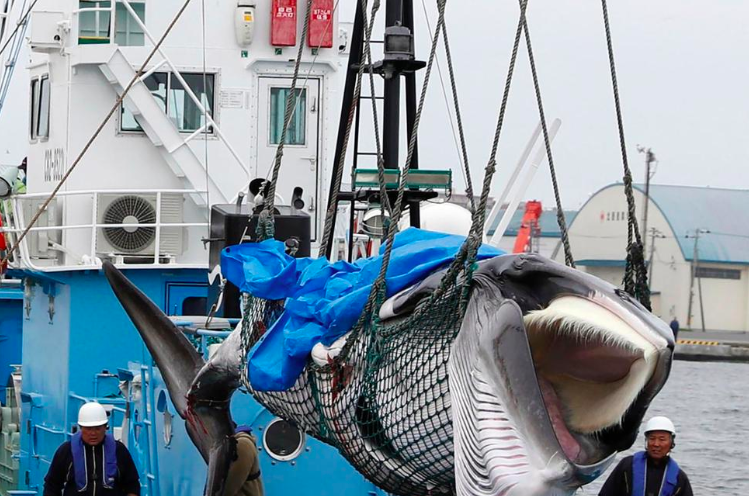
A whale is unloaded on July 1 in Kushiro, Japan Photo: Masanori Takei, Kyodo News via AP
By Margaret Johnston and Monica Medina
According to the Associated Press, Japanese whaling vessels returned to port with two minke whales last week — this is the first time Japan’s ships conducted a commercial hunt since an international moratorium on commercial whaling went into effect in the 1980s, joining the Norway and Iceland in defying the global ban on selling whale meat. Japan had announced recently that they are leaving the International Whaling Commission, and will be resuming commercial whaling, but ending “research whaling,” which was always believed by international whale conservation organizations to be a ruse.
Why This Matters: Japan is actually reducing its whale catch now that it will no longer be taking hundreds annually from a whale sanctuary in Antarctica, and the whaling must make money or it will be further curtailed. Government subsidies that propped up their “scientific” hunts will be phased out and all whaling will now take place inside Japan’s 200-mile exclusive economic zone. Coastal whaling doesn’t make much economic sense — whale meat accounts for less than 0.1% of the total meat consumption in fiscal 2017, according to Japanese government data so it is unlikely that the industry will grow. But flouting the rule of international law is not in keeping with Japanese government norms. It will be interesting to see if this is a face-saving way for Japan to end its whaling entirely – through market forces rather than pressure from governments like the U.S. and Mexico and Australia, among others. Some, such as Patrick Ramage the Marine Conservation Director at the International Fund for Animal Welfare, argue that this is a huge step forward for whale conservation. We hope he is right.
Japan’s New Commercial Whaling Program.
According to the AP, the commercial whaling will be carried out by two distinct types of vessels — the former “research” vessel, the Nisshin-maru and two support boats that used to go to the Antarctic will travel to the legal extent of Japan’s 200 nautical mile exclusive economic zone to catch minke, Bryde’s and sei whales. In addition, a small fleet of five other ships will stay closer to the coast to hunt minkes, in addition to 168 Baird’s beaked and two other kinds of small whales they have been catching for years outside of IWC jurisdiction — just flouting the international rules.
- Combined they plan to catch 52 minkes, 150 Bryde’s and 25 sei whales through the end of this year – the announcement of these numbers was delayed until after the G20 leaders left Japan to avoid controversy.
- In 1986, a global moratorium was passed by the International Whaling Commission (IWC), putting a stop to commercial whaling. However, a loophole was found and exploited, which stated that nations could kill whales for research purposes.
- Since the moratorium was passed, approximately 23 thousand whales have been reported to the IWC as having been killed by Japanese “research” ships.
- Iceland caught only 17 whales, while Norway hunted 432 in the 2017-2018 season, according to the AP.
Whale Watching A Growing Industry in Japan.
As it turns out, more Japanese people prefer to watch whales than to eat them. The Japanese whale watching industry is growing. Worldwide it’s a 2 billion dollar industry, and commercial whaling in Japan’s coastal waters will conflict with whale watching, so it will likely be more economical to reduce commercial whaling and allow for more opportunities to spot these incredible animals.
- Now that the International Whaling Commission’s has succeeded in reducing the number of whales killed in the name of Japanese research, it can focus instead on reducing ship strikes, whales caught in nets, and ocean noise.
- As Patrick Ramage said, “It’s a win-win solution. It results in a better situation for whales, a better situation for Japan, a better situation for international marine conservation efforts, and is, therefore, to be welcomed.”
To Go Deeper: You can watch the full press conference by the International Fund for Animal Welfare.
July 7, 2019 » Commercial Whaling, International Whaling Commission, Japan, whales, whaling


